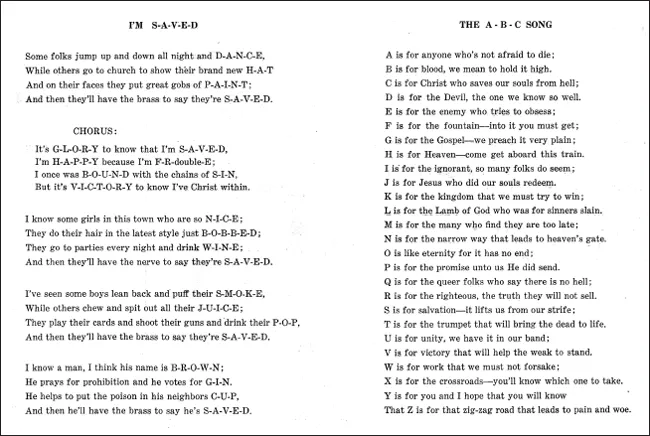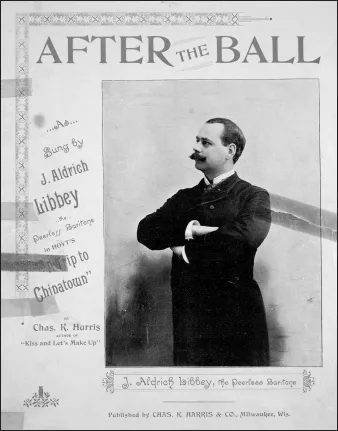![]()
APPENDIX 1
Blue Sky Boys Songs: An Annotated List
The following annotated list covers titles on surviving studio records made for publication and broadcast by the Blue Sky Boys between 1936 and 1975. Copper Creek has published six compact discs of excerpts from sixteen-inch program transcription discs made at WGST (Atlanta) in 1946–47 and WCYB (Bristol, Virginia) in 1949. For the discography, Copper Creek’s Gary Reid generously supplied all titles and indicated those on compact disc. Many of Bill Bolick’s discussions of individual songs come from Gary’s interviews. Bill’s comments appear in italics, and I’ve noted 78 rpm discs (excluding those by the Blue Sky Boys) that were in his personal collection.
In organizing entries I normally default to a published song’s original title when known. In the 1930s producer Eli Oberstein routinely altered titles to avoid royalty payments on copyrighted songs. It was a practice unique to Eli and RCA, and Bill’s comments about it alternate between irritation and resignation. In other cases titles have evolved over time as old songs entered tradition and acquired multiple identifications. In cases where I’ve substituted title headings for those appearing on Blue Sky Boys records, the latter are noted with a see reference. I’ve overlooked minor variations that don’t disturb the alphabetic sequence.
Songs are fungible and negotiable properties, and record label composer credits rarely differentiate between copyright ownership and actual composition. Songs cited here are credited with composers of record even when identifications are inconclusive or clearly spurious. Many songs once in the public domain have been copyrighted, re-copyrighted, and bear credits substituting owner names for actual composers. Others have been published more than once by different claimants, and still others are too old or obscure to be traced to their origins with certainty. Traditional ballads and other songs with narrative content have been collected and indexed by G. Malcolm Laws Jr. in American Balladry from British Broadsides (1957) and Native American Balladry, rev. ed. (1964). The Blue Sky Boys recorded variants of five songs found in Francis James Child’s The English and Scottish Popular Ballads (1882–98). Songs appearing in these collections are cited.
In 1973 an entire issue of the Journal of Country Music (Volume IV, No. 4) was devoted to a diary of songs performed by the Blue Sky Boys from May 9, 1939, through May 9, 1940, on daily fifteen-minute shows from WGST (Atlanta) and WPTF (Raleigh), maintained by a loyal listener, Ruth Walker of Greensboro, Georgia. Although her list is a valuable document, the shows themselves do not survive. Titles known only from her entries are not always clear and are omitted here.
Annotations for recently composed songs the Bolicks recorded for RCA in 1946–50 and Starday (1963) are often brief or nonexistent. With a handful of exceptions, songs from this era were the product of professional writers and few enjoyed an afterlife. Bill assessed them candidly: “Songs that we recorded postwar weren’t necessarily our most popular or ones we liked best. They were songs that as far as we knew had never previously been recorded, or we felt that our style was so much different that it wouldn’t hurt us if they had been recorded.” Other professionally composed songs reach back to the mid-nineteenth century, and Bill sometimes had no comments to make on them either. A list of sources for Blue Sky Boys songs follows this song list.
Lists of Blue Sky Boys songs recorded by other artists that follow each entry are selective. The citations include early versions, later ones that Bill and Earl probably knew, and significant later ones. Entries normally include original record numbers, selected appearances on further labels, and current or recently available compact discs. The abbreviation ARC stands for American Record Corporation, whose 1930s releases appeared with identical catalog numbers on Melotone, Perfect, Oriole, and other chain-store labels after 1935. Conqueror was a Sears and Roebuck house label that used an independent numbered series. For further information, see:
Guthrie T. Meade, Jr., Dick Spottswood, and Douglas S. Meade, Country Music Sources. Chapel Hill: University of North Carolina Press, 2002.
Praguefrank.com, an online country music discography site.
Tony Russell, Country Music Records, a Discography, 1921–1942. New York: Oxford University Press, 2004.
The following compact disc sets include broadcast excerpts and virtually all published Blue Sky recordings except for 1963 home recordings collected on County 752, which have yet to appear on compact disc.
Sunny Side of Life, Bear Family BCD 15951 EK (RCA studio tracks, 1936–50)
A Treasury of Rare Song Gems From the Past, Gusto GT7-0695-2 (1947/49 radio transcriptions)
Are You from Dixie, Gusto GT7-0549 (Starday sessions, 1963)
The Blue Sky Boys in Concert, Rounder 11536 (1964)
Presenting The Blue Sky Boys, Capitol ST2483, Arhoolie CD 9063 (1965)
The Blue Sky Boys, Rounder 0052 (1975)
Several others, drawn from radio transcriptions made at WGST (Atlanta) and WCYB (Bristol) are no longer in print:
On Radio, Volumes 1–4, Copper Creek CCCD-0120, 0121, 0145, 0146 (WGST radio transcriptions, 1946–47)
Farm and Fun Time Favorites, Volumes 1–2, Copper Creek CCCD-0125, 0126 (WCYB radio transcriptions, 1949)
At this writing, a new collection is in preparation:
Rare Radio Transcriptions, Patuxent CD-280
RECORDINGS
The ABC Song (Esther Glosson)
We learned this song from Ray and Ina Patterson, who came to visit when we were broadcasting over WNAO in 1948. We had them as guests on several programs. To the best of my knowledge, they sent us their recording of it in 1947. We termed this a religious song but always considered it a novelty number. It was different from other spelling songs we knew and we drew better than average fan mail with it.
“I’m S-A-V-E-D” and “The B-I-B-L-E” are other Blue Sky Boys songs with spelling themes.
Blue Sky Boys, WCYB (Bristol, VA, 1949), Copper Creek CCCD-0125
Courtesy of Lester S. Levy Collection of Sheet Music, Sheridan Libraries, Johns Hopkins University.
After the Ball (Charles K. Harris, 1897)
This landmark song laid a career foundation for a Tin Pan Alley pioneer. Harris (1867–1930) had been a bellhop, pawnbroker, and banjo instructor before composing and self-publishing this song, and opening a songwriting office in Milwaukee. It became an immediate hit and enduring standard, and he moved his office to New York around 1895. Other Harris hits that became country classics include:
I Love You Best of All (1893)
There’ll Come a...


